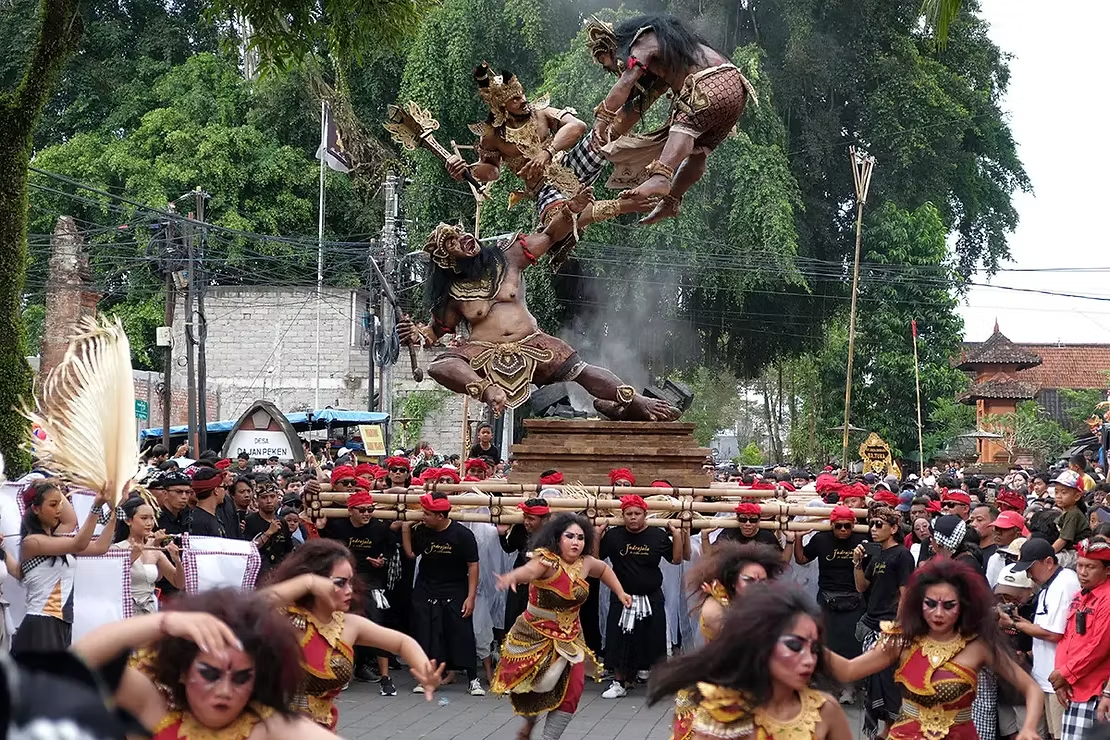Ньепи: День тишины на Бали — уникальный праздник духовного очищения
Бали известен не только своим разнообразным ландшафтом и культурой, но и как регион с самым большим индуистским населением в Индонезии. Здесь отмечают один из самых уникальных праздников в мире: Ньепи (День тишины). В отличие от большинства шумных торжеств, Ньепи — день безмолвия, размышлений и духовного очищения. Этот религиозный день знаменует собой балийский Новый год по лунному календарю Сака и предназначен для самоочищения и медитации.
Когда отмечают Ньепи
Ньепи выпадает на первое новолуние десятого месяца (Чайтра) по балийскому календарю Сака, что обычно приходится на март или начало апреля. В 2025 году Ньепи будут отмечать 29 марта. Праздник строго соблюдается по всему острову, включая популярные туристические районы, такие как Убуд, Кута, Семиньяк и Улувату.
Если вы планируете посетить Бали в это время, обязательно подготовьтесь заранее, так как все общественные службы будут закрыты в течение 24 часов с 6 утра 29 марта до 6 утра 30 марта. Даже международный аэропорт Нгурах-Рай будет закрыт на 24 часа. Этот факт делает Бали единственным местом в мире, где закрывается аэропорт на религиозный праздник.
Запреты в День Ньепи
Суть празднования Ньепи заключается в соблюдении Чатур Брата Пеньепян — четырех ограничений для индуистов в этот день. Эти запреты включают:
Амати Гени (Нет огня и света): Избегать использования огня, света и даже электричества для сохранения темноты и покоя.
Амати Карья (Нет работы): Прекратить все формы физической и экономической деятельности, чтобы сосредоточиться на внутреннем созерцании.
Амати Лелунган (Нет путешествий): Находиться дома, не выходить на улицу.
Амати Лелангуан (Нет развлечений и удовольствий): Воздержаться от развлечений, отдыха и веселья.
Следуя этим принципам, балийские индуисты верят, что могут очистить себя и остров, создавая мир как первый шаг в новом году.
Уникальность Дня тишины
Ньепи не похож ни на один другой праздник в мире. На 24 часа вся деятельность на острове Бали полностью прекращается. Балийцы верят, что таким образом они могут очистить себя и остров от прошлых грехов, начать все заново духовно и поддерживать гармонию с природой. Индуисты также считают, что в это время злые духи свободно бродят повсюду. Если сделать Бали похожим на необитаемый остров, злые духи покинут его на целый год.
Что можно и чего нельзя делать в Ньепи
С 6:00 утра в день Ньепи до 6:00 утра следующего дня необходимо соблюдать следующие строгие правила:
Саморефлексия и медитация: Сделайте Ньепи днем для связи с собой, медитации и практики благодарности.
Оставайтесь в помещении: Все, включая путешественников, должны находиться в своих домах или отелях.
Наслаждайтесь тишиной: Ньепи — идеальный момент, чтобы отключиться от суеты современной жизни и устроить цифровой детокс.
Уважайте местную культуру: Даже будучи гостем, чтить эту традицию очень важно, чтобы проявить уважение к верованиям балийцев.
Качественное время с семьей: Используйте день Ньепи как время для семьи, вдали от ежедневной суеты и гаджетов.
❌ Никакого света и огня: Даже ночью свет должен быть приглушен или выключен, чтобы остров оставался темным.
❌ Никакой работы: Деловая активность отсутствует, магазины и даже аэропорт полностью закрыты.
❌ Никаких поездок: Запрещено выходить из дома и бродить по общественным улицам, за исключением экстренных служб, таких как скорая помощь, которым разрешен проезд в случае крайней необходимости.
❌ Никаких развлечений: Включать телевизор, радио, музыку и все, что создает шум, запрещено.
❌ Никакой готовки: Еду следует приготовить заранее, чтобы избегать разведения огня или приготовления пищи непосредственно в день Ньепи.
Ночь накануне Ньепи
Одна из самых ожидаемых частей празднования Ньепи — это парад Ого-ого, который проходит ночью накануне праздника. Что такое Ого-ого? Ого-ого — это гигантские статуи из папиросной бумаги и бамбука со сложными и жутковатыми дизайнами, символизирующие злых духов и негативную энергию. Созданные местными жителями, Ого-ого являются впечатляющим произведением искусства, чаще всего принимающими облик демонов из балийской мифологии.
Завораживающее шествие Ого-ого
Шествие Ого-ого проводится в Тавур Кесанга (ночь перед Ньепи), которая в 2025 году выпадает на 28 марта. Парад проходит по всему Бали: от туристических районов, таких как Денпасар, Убуд, Кута, Санур, до небольших деревень. Чтобы увидеть более яркое шествие, рекомендуется посмотреть его на площади Пупутан в Денпасаре или вдоль дороги на пляж Куты.
На закате по всем деревням Бали проходят массовые шествия, где статуи проносят по улицам под звуки музыки гамелана, с факелами и творческими традиционными танцами. Говорят, что эта активность направлена на пробуждение и привлечение негативных духов. С наступлением ночи Ого-ого сжигают, что символизирует уничтожение злых сил и очищение острова перед наступлением Ньепи.
Советы для посетителей и неиндуистов во время Ньепи
Несколько важных советов для неиндуистов и туристов, посещающих Бали или находящихся на острове во время Ньепи. Их необходимо соблюдать во время этого уникального праздника:
Подготовьтесь заранее: Запаситесь едой, закусками и другими предметами первой необходимости как минимум за несколько дней до Ньепи. Избегайте покупок накануне Ньепи, так как в этот день в большинстве супермаркетов наблюдается значительный наплыв посетителей. Кроме того, большинство дорог перекрыто для парада Ого-ого, поэтому ожидайте пробок в определенных местах.
Соблюдайте тишину: Даже если вы находитесь внутри отеля или виллы, жильцы обязаны избегать громких звуков, музыки или занятий, нарушающих тишину.
Устройте цифровой детокс: Воспользуйтесь этим моментом, чтобы отключиться от технологий, почитав книгу, пообщавшись с семьей или медитируя.
Наслаждайтесь ночным небом: Из-за отсутствия света и затемнения, ночь Ньепи дает одну из лучших возможностей увидеть кристально чистое, усыпанное звездами небо.
Остерегайтесь Печаланг: Печаланг — это традиционные балийские охранники, которые патрулируют улицы и следят за соблюдением правил Ньепи. Любого, кого застанут на улице, попросят немедленно вернуться в свое жилье или даже оштрафуют.
Заключение
Ньепи — это не просто религиозное торжество; это время для духовной и экологической трансформации. Балийцы верят, что совместное участие в соблюдении тишины приносит баланс и гармонию в мир. Соблюдение правил не только демонстрирует уважение к местной культуре, но и позволяет нам пережить нечто очень значимое.
Если кто-то не уважает Ньепи и его правила, шумит или бродит снаружи, его привлекут к ответу Печаланг. Сознательное несоблюдение может привести к серьезным социальным и культурным последствиям, включая штраф или даже просьбу покинуть остров в крайних случаях.
Находиться на Бали во время Ньепи — это редкая возможность остановиться, поразмышлять и оценить красоту тишины и покоя. В конце концов, в нашем шумном мире немного тишины может стать самым значимым опытом.
Ключевые слова: Ньепи, День Ньепи, индуистский Новый год, балийские традиции, День тишины, парад Ого-ого, культура Бали, индуистские ритуалы, саморефлексия, Чатур Брата Пеньепян, балийский календарь, Новый год Сака, Тапа Брата, балийские индуисты, духовное очищение, традиционные балийские церемонии, туризм на Бали, религиозные праздники, запреты Ньепи, священные ритуалы.



